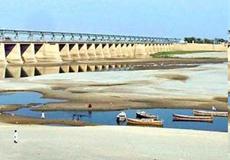|
Islamabad: Observers in Pakistan say that India may have stolen a decisive march in the battle for water ''priority rights'' between the two - frequently warring -neighbours. Pakistan, they feel, may have, for all practical purposes, already lost the case against India on the controversial 330mw Kishanganga hydropower project even before formal commencement of legal proceedings in the international Court of Arbitration (CoA).  While India initiated the Kishanganga hydropower project to generate 330mw of electricity Pakistan initiated the Neelam-Jhelum Hydroelectric Project, which lies downstream, to produce 969mw of electricity. While India initiated the Kishanganga hydropower project to generate 330mw of electricity Pakistan initiated the Neelam-Jhelum Hydroelectric Project, which lies downstream, to produce 969mw of electricity.
The simple conundrum to be resolved by the CoA is to judge which country is ahead on its respective project. Under the terms of the Indus Waters Treaty of 1960 between India and Pakistan, the country which finishes its project first on the Neelam would get ''priority rights'' to the use of the river's waters. Disputed waters The Kishanganga River assumes the name of Neelam River when it enters the Pakistan-occupied- Kashmir (Azad Jammu & Kashmir) region and further downstream becomes the Jhelum upon entering Pakistan. India proposed to build the barrage in 1984 on River Kishanganga, at the mouth of Wullar Lake, India's largest fresh water lake, near Sopore town in Kashmir Valley. The proposed site for dam is near Kanzalwan – a town from where the river enters Azad Kashmir. The Indian plans include storing water and then tunnelling it to the Wuller Lake, where it is constructing a 330mw powerhouse. Pakistan is constructing its Neelum-Jhelum Hydropower project near Muzaffarabad, capital of Pakistani-occupied-Kashmir (PoK). With the help of a tunnel, waters of the Neelam River will be diverted from Nauseri, about 41km east of Muzzafrabad and after passing through power generating turbines at Chatter Kalas, 22 km south of Muzaffarabad, they will be released in the Jhelum River, about 4 km south of Chatter Kalas. The project is designed to produce 969mw of electricity on an annual basis. Pakistan has opposed construction of the Kishanganga hydropower project, claiming diversion of waters of Neelum is not allowed under the 1960 Indus Waters Treaty. It claims it will face a 27 per cent water deficit, when its own project is completed in 2016. The reduced water flow in the Neelum would also ensure that the required results of the proposed Neelum-Jehlum hydropower project would not be attained. Arbitration Members of the international Court of Arbitration (CoA) constituted to resolve the dispute had earlier visited Pakistan, and subsequently India in the month of June, to assess the extent of the work completed on the respective Neelum-Jehlum Hydropower and Kishenganga projects. It is the CoA's business to assess which country is likely to complete the project first, as water priority rights of the Neelum River will then be accorded to that nation under provisions of the Indus Water Treaty. Should the CoA assess that the N-J project lags behind the Kishenganga project, Pakistan will not only lose water priority rights but also the legal battle with India. On the other hand, if the CoA finds that the Indian project is far behind the N-J project in terms of construction work, India will lose the battle and water priority rights. The Court of Arbitration is chaired by Stephen M Schwebel of United States, who is a former president of the International Court of Justice. In addition to the expert briefings and features observed during the site visit, the court will also consider the written and oral pleadings submitted by Pakistan and India after which it will issue the award. Pakistan deposited its memorandum with the CoA at the end of May 2011 and under rules India gets six months to submit a reply. Pakistan moved the CoA in Hague to stop India from constructing the Kishenganga dam, arguing that the construction negated the Indus Waters Treaty 1960 by diverting waters. Pakistani fears The Indian Kishenganga project is likely to be completed by 2014 while the Pakistani Neelum-Jhelum project is scheduled for completion by 2016. Observers in Pakistan now say that by the time the CoA starts hearing the case India will very likely have completed 90 per cent of the project. An unidentified monthly report on the Kishanganga project, quoted by these observers, suggests that India may have already completed 40 per cent construction work on the project. Because of this there is a certain amount of anger in Pakistan as the country's water and power ministry had earlier informed the Senate Committee on Water that India had only completed 23.5 per cent work on the project. The monthly report, quoted by Pakistani observers, reveals that 29 per cent work on the Spillway left bank, 36 per cent on the Head Race Tunnel and 48 per cent on the Surge Shaft has been completed. Engineering firms from three countries - the UK, Italy and Germany - are subcontractors on the project, which these observers say provides India with a certain amount of political clout. They point out that India has already reduced the timeframe to complete the Kishenganga project by 2014, even as Pakistan tries to complete the Neelum-Jhelum project by 2016. Observers point out that while India is using the advanced Tunnel Boring Machine to complete its project Pakistan will acquire the technology only in 2012.
|